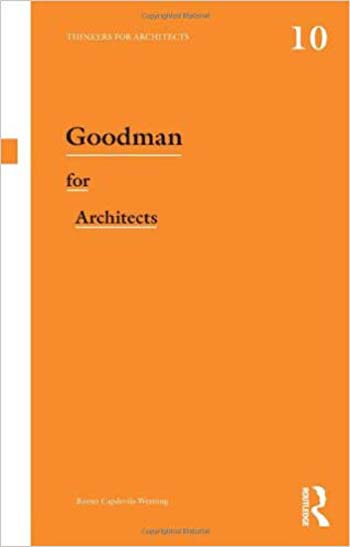نام کتاب: Goodman for Architects
نویسنده: Remei Capdevila-Werning
ویرایش: ۱
سال انتشار: ۲۰۱۳
فرمت: PDF
تعداد صفحه: ۱۴۴
انتشارات: Routledge
Description About Book Goodman for Architects From Amazon
American philosopher Nelson Goodman (1906-1998) was one of the foremost analytical thinkers of the twentieth century, with groundbreaking contributions in the fields of logic, philosophy of science, epistemology, and aesthetics. This book is an introduction to the aspects of Goodman’s philosophy which have been the most influential among architects and architectural theorists.
Goodman specifically discussed architecture in his major work on aesthetics, The Languages of Art: An Approach to a Theory of Symbols (۱۹۶۸), and in two essays “How Buildings Mean” (1985), and “On Capturing Cities” (1991). His main philosophical notions in Ways of Worldmaking (۱۹۷۸) also apply well to architecture. Goodman’s thought is particularly attractive because of its constructive aspect: there is not a given and immutable world, but both knowledge and reality are constantly built and rebuilt. Whereas other theories, such as deconstruction, implicitly entail an undoing of modern precepts, Goodman’s conception of world-making offers a positive, constructive way to understand how a plural reality is made and remade.
Goodman’s approach to architecture is not only relevant thinking in providing new insights to understanding the built environment, but serves also as an illustration of analytical thinking in architecture. This book shows that the methods, concepts, and ways of arguing characteristic of analytical philosophy are helpful tools to examine buildings in a novel and fruitful way and they will certainly enhance the architect’s critical skills when designing and thinking about architecture.
درباره کتاب Goodman for Architects – ترجمه شده از گوگل
فیلسوف آمریکایی نلسون گودمن (۱۹۰۶-۱۹۹۸) یکی از متفکرترین تحلیلگران تحلیلی قرن بیستم بود، با مشارکت ابتدایی در زمینه منطق، فلسفه علم، معرفت شناسی و زیبایی شناسی. این کتاب مقدمه ای بر جنبه های فلسفه گودمن است که در میان معماران و نظریه پردازان معماری تاثیر گذار بوده است.
گودمن به طور معماری در کارهای اصلی خود در مورد زیبایی شناسی، زبان های هنری: رویکرد به نظریه نمادها (۱۹۶۸) و در دو مقاله “چگونه ساختمان ها به معنی” (۱۹۸۵) و “در مورد شهرها” (۱۹۹۱) توضیح داده شده است. مفاهیم اصلی فلسفی او در راه Worldmaking (1978) نیز به معماری می پردازد. اندیشه گودمن به دلیل جنبه سازنده آن به ویژه جذاب است: یک جهان داده شده و غیر قابل تغییر نیست، اما هر دو دانش و واقعیت همواره ساخته و بازسازی می شوند. در حالی که نظریه های دیگر مانند تخریب، بطور ضمنی باعث لغو نظریه های مدرن می شوند، تصور گودمن در مورد ساختن جهان، راه حلی مثبت و سازنده ای برای درک اینکه چگونه یک واقعیت چندگانه ساخته شده و بازسازی می شود، ارائه می دهد.
رویکرد Goodman به معماری نه تنها تفکر مربوطه را در ارائه بینش جدید برای درک محیط ساخته شده است، بلکه همچنین به عنوان یک تصویر تفکر تحلیلی در معماری نیز خدمت می کند. این کتاب نشان می دهد که روش ها، مفاهیم و روش های بحث در مورد ویژگی های فلسفه تحلیلی ابزار مفید برای بررسی ساختمان ها در یک رمان و کارآمد هستند و مطمئنا مهارت های مهم معمار را در طراحی و تفکر در مورد معماری ارتقا می دهند.
[box type=”info”]![]() جهت دسترسی به توضیحات این کتاب در Amazon اینجا کلیک کنید.
جهت دسترسی به توضیحات این کتاب در Amazon اینجا کلیک کنید.![]() در صورت خراب بودن لینک کتاب، در قسمت نظرات همین مطلب گزارش دهید.
در صورت خراب بودن لینک کتاب، در قسمت نظرات همین مطلب گزارش دهید.
[tabs slidertype=”simple” auto=”yes”] [tab]
دسته های پرطرفدار دانلود کتاب معماری
- دانلود کتاب معماری پایدار
- دانلود کتاب معماری منظر
- دانلود کتاب معماری داخلی
- دانلود کتاب تاریخ معماری
- دانلود کتاب جزئیات در معماری
- دانلود کتاب آثار معماران بزرگ
- دانلود کتاب سازه در معماری
- دانلود کتاب طراحی شهری
- دانلود کتاب معماری دیجیتال
- دانلود کتاب روانشناسی محیطی
- دانلود کتاب راندو و اسکیس
[/tab] [/tabs]

